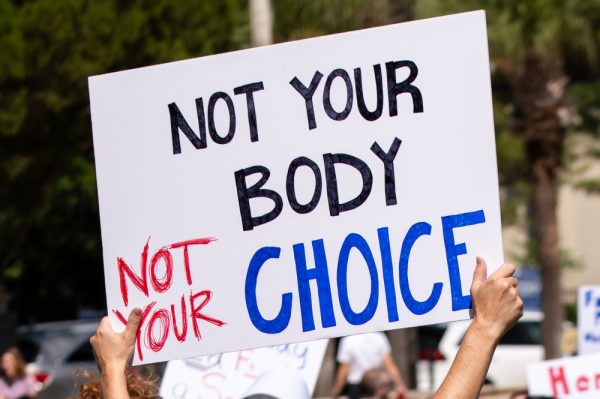The reality of death and loss in High School

On my first day of high school, my mom was diagnosed with stage IV colon cancer. The day I took my first SAT, she told me the time she had left to live. And she died the day after my junior prom. I have never had the normal high school experience because those years were defined by chemotherapy infusions, scans, and pain.
However shocking, this experience is far too common and childhood grief in America is too frequently overlooked. An estimated 1 in 14 children in the U.S. will lose a parent or sibling before age 18, adding up to over four million children nationally.
Speaking from experience, the death of a parent is life-altering. And even worse, is seeing a loved one’s decline due to a terminal illness. The person that you once knew fades away and you grieve the life that this person once had.
But the range of losses that a high school student has is diverse. It could be something such as the death of a pet, a grandmother with Alzheimer’s disease who lost her mental capabilities, or even a father who had a heart attack and died immediately.
Each of these losses are deeply important to the people who experienced them and all must be grieved. But in our society and in the American school systems, death is not spoken about. Oftentimes when people are faced with the idea of death, they defensively turn to things they believe will shield them from death which is extremely harmful to those grieving, especially young kids.
I left school for two weeks to care for my mom in her last week of life and to grieve her death. In these two weeks, I lost not only my mom but also my best friend, role model, and guiding force for my family. As I prepared for my return to MHS, I was an extremely different person, as are so many students when they return to school after trauma. But when I walked through the doors of MHS I had never felt more alone. Not a single counselor or teacher greeted me after this troubling time and during my first class of the day instead of being showered with condolences from my teacher and friends, I was ignored and told to immediately create a plan for how I would make up my missed work.
This experience is first-hand proof of how although bereavement is present in the workplace, grief resources in schools are extremely lacking. According to the New York Life Foundation, only 7% of teachers in the U.S. have had any amount of bereavement training and only 25% of students who lost a parent growing up say their school was well prepared to support them.
According to the district website, MHS has 5 on-staff psychologists, 10 counselors, 3 restorative justice counselors and 2 student assistance coordinators. With this extensive amount of counselor staff that are present in Montclair and at most schools in the country, the lack of support for grieving students is unacceptable.
It’s no secret that grieving children and teens are at risk for poor school performance, absenteeism, mental health issues, addiction, behavior problems, and depression but with support from schools and educators, students can have the resources they need to make a difference in a grieving student’s life.
In October 2020, the American Federation of Teachers released a survey in which 95% of educators say they would like to do more to help grieving students and 91% of educators say they would be interested in participating in bereavement training.
Here in Montclair many teachers and parents have this same sentiment. Currently, the Montclair School District is considering becoming a grief-informed school in partnership with “Imagine, a Center for Coping with Loss.” “Imagine’s” goal is to create communities where students who have experienced a painful loss grow up emotionally healthy with the ability to live up to their unique potential. They do this by training school administrators, staff, parents, and students themselves, on how to support grieving youth.
The training provided to make Montclair a grief-informed district could benefit so many students for years to come. Teachers would finally receive the training they need on grief and loss, along with strategies for how to support grieving students and coworkers so that no student ever has to go through what I did upon my return to school.
And it’s not just Montclair that would benefit from grief education, it is a state-wide issue. On November 14, a bipartisan NJ bill (Bill S3330) was introduced that would require public schools to discuss grief and how to cope with loss during health classes for students in eighth through 12th grades. Grief comes in all forms and loss is a universal experience. And as a result of this bill, students will soon have the knowledge they need in order to support fellow students, because no one should have to grieve alone.
When it comes to death in high school, our language and fear of death are also significant parts of the problem. In particular, speaking about cancer it illustrates society’s discomfort with death and dying. People “battle cancer,” “lose their fight” with cancer, and are dubbed “survivors” if they achieve remission. But my mom and most other cancer patients dislike this harmful language because it makes people believe death and dying are seen as failures of our bodies and technology.
Through grief awareness at the high school level and beyond, this narrative needs to change in order to show that acknowledging the inevitable end, is just as heroic as going into remission.
If I could say one thing to MHS administration and students on behalf of grieving high schoolers everywhere, I would say please don’t ignore death, because although people may think they are sparing the student from an emotional toll, it just imprints a further sense of disbelief in a grieving person’s life.
Grieving is hard and there is no right way to do it, especially as a teenager, but with the support of schools and educators, it can be significantly easier.






Janesse • Dec 8, 2022 at 7:19 am
So happy to hear about this and agree it is such a need. My son saw me go through my cancer battle and although I survived, the emotional toll it has had on him is immeasurable. Support is desperately needed